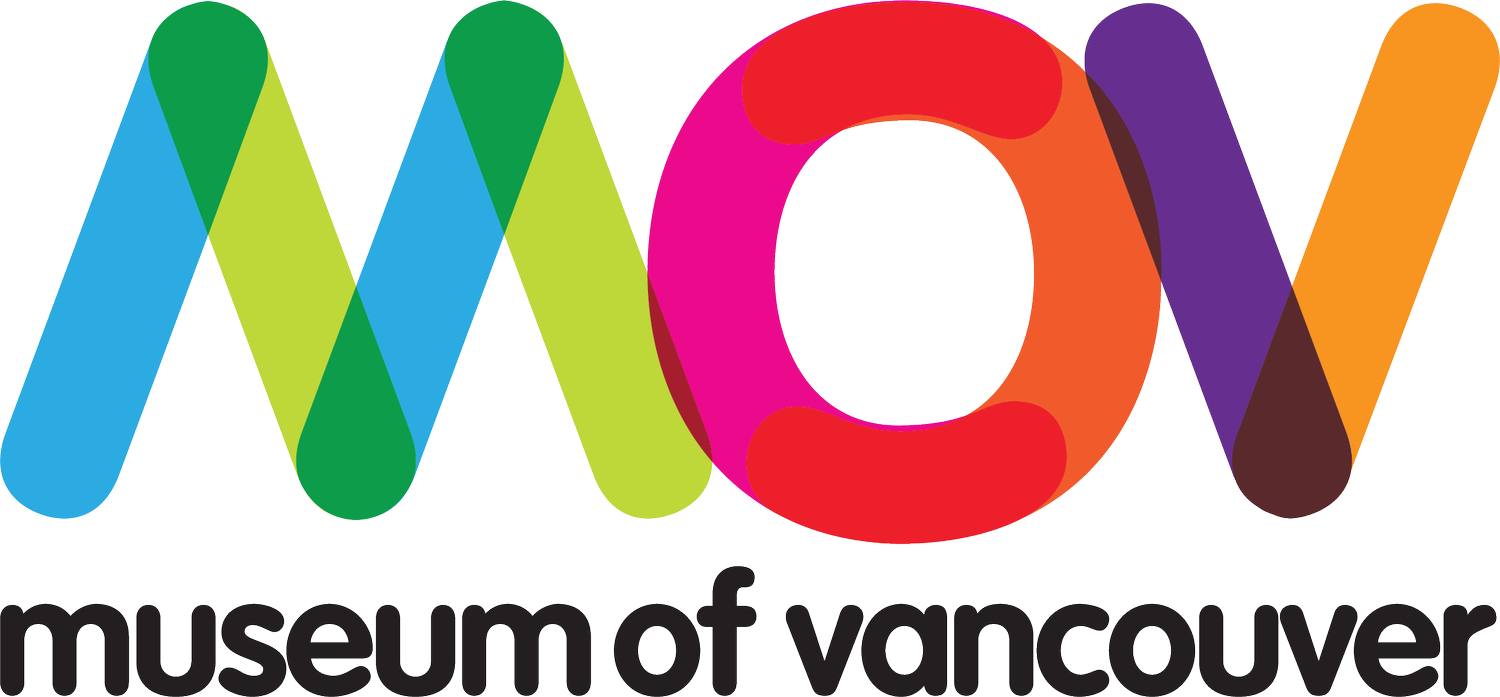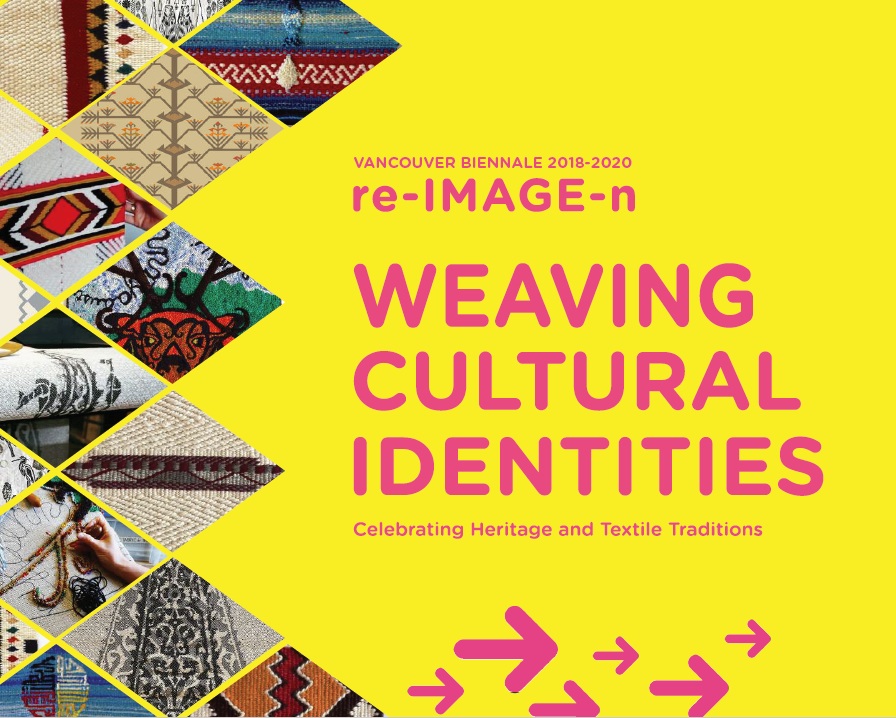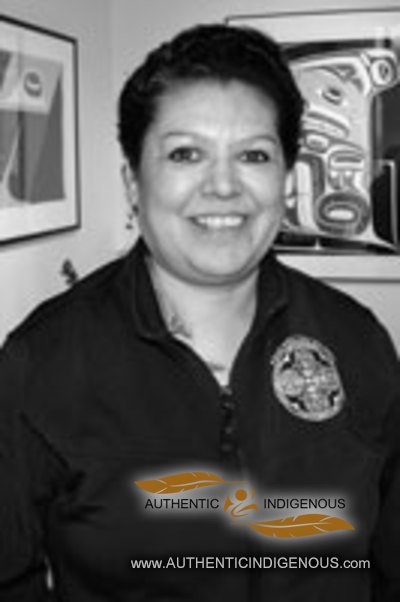Vancouver Biennale, in partnership with Museum of Vancouver, present Weaving Cultural Identities a multipurpose project that brings Indigenous and Islamic communities together in a collaborative exploration of weaving traditions and histories.
As an extension of the first phase of Weaving Cultural Identities, Threads Through Time six renowned Musqueam and Squamish weavers were invited to engage in conversations on ways in which land has been colonized, shared and demarcated. Through these reflections, the weavers have created five individual, unique 8 x 4 feet panels which serve to channel their experience of the land and the voices of their ancestors. Inspired by this dialogue and in honoring these experiences, a team of weavers from the Musqueam, Squamish and Tsleil-Waututh Nations working with jacquard weavers and a designer collaborated to create a large border which will hold these panels together. Ultimately a 31 x 15-foot rug will be created as a symbol and product of this intercommunity exchange.
In the days leading up to the June 27th Biennale public opening in Vanier Park, the varied yet unified parts of this rug will come together in a stitching ceremony at Museum of Vancouver between 24th and 27th June 2019. The weavers and other textile artists will engage in free-form dialogue whilst joining together these individual stories, in celebration of our differences as well as commonalities.
Weaving Cultural Identities unpacks complex issues of belonging, displacement, diaspora, the land and identity. Through collective ‘making’ and dialogue, Weaving Cultural Identities has lent a platform and safe space for these uneasy conversations, whilst also providing an opportunity for learning across cultures.
Event Dates:
Stitching Ceremony, public viewings of the weavers and their textile project:
Monday, June 24 through Thursday, June 27, 2019
10am – 5pm
Public conversation with the weavers:
Tuesday, June 25, 2019
4pm – 5pm.
Both events are open to visitors with Museum admission ticket.
Admission: Adult: $20.50; Student: $17.25 (requires valid student ID); Senior: $17.25 (age 65+); Youth: $13.75 (ages 12-18); Child: $9.75 (ages 5-11); Family: $43 (2 adults/seniors and up to 3 youth); Child 4 and under: Free.
Bios:
Debra Sparrow has been deeply involved with the revival of Musqueam weaving for over 30 years, having many years of study, trial, and learning directly from the work of her ancestors. Debra’s work has been collected and exhibited nationally and internationally including at The University of British Columbia, The Canadian Museum of History (previously Civilization), The Royal BC Museum, The Vancouver International Airport (YVR Collections), the Burke Museum (Seattle), and the Smithsonian. She was the recipient of the BC Creative Achievement Award for First Nations Art in 2008. Most recently, she participated in “The Fabric of Our Land: Salish Weaving” at the Museum of Anthropology both as an exhibitor and as a regular, active weaving demonstrator using a traditional loom from the museum collection. Important for Debra is to pass on the Salish weaving practice and Musqueam history to the future generations, which led to her involvement in the cocreation of the Musqueam Museum School with the University of British Columbia. In addition to teaching classes, she also shares her knowledge through public speaking, presentations, and publications (including UNESCO, 2001).
Robyn Sparrow was born and raised in the Musqueam Nation; she is a self-taught Master Weaver. At an early age, Robyn felt a need to find out who she was spiritually, who her ancestors were, and the history of her people. She decided to follow the path of arts and textiles and found herself inspired to learn and carry on the tradition of Coast Salish weaving. Robyn Sparrow and her two sisters, Debra Sparrow and Wendy Grant, revived the art of weaving in 1980 by speaking to their elders and researching; they continue to work together and independently. The artist and her sisters have formed a group of Musqueam weavers and continue to pass on their traditions and knowledge to future generations Sparrow’s work continues to be exhibited across British Columbia in a number of venues, shows, and public projects.
Chepximiya Siyam’ Janice George and Skwetsimeltxw Willard ‘Buddy’ Joseph are accomplished weavers and teachers from the Squamish Nation. They co-founded L’hen Awtxw Weaving House to share the teachings and practice of traditional Coast Salish wool weaving. Chief Janice George graduated from Capilano University, North Vancouver BC, and the Institute of American Indian Arts, Santa Fe, NM. She feels her education at these schools helped her excel as a teacher, adding to her most important traditional teachings. Janice is a hereditary chief, trained museum curator and educator. Janice additionally co-organized the 1st Canada Northwest Coast Weavers Gathering with other Squamish Nation Weavers. George and Joseph are from prominent Squamish families and have numerous ceremonial and cultural responsibilities in their community. Joseph is the former director of the Squamish Housing and Capital Projects and currently consults on capital projects for First Nations communities.
Krista Point is a Coast Salish Weaver of the Musqueam Nation. In over thirty years of weaving, Krista’s work has been displayed at exhibitions with Susan A. Point (renown Coast Salish Artist) and in places such as Thunder Bay Art Gallery, Montreal, and Switzerland. Notably, Krista’s work has been include in feature displays at the YVR Airport, Smithsonian Museum, Museum of Anthropology (University of British Columbia), CBC, and the Bill Reid Foundation. Local showcases include the Planetarium, Expo Site ‘86, the P.N.E., and several local secondary schools. Krista has also taught at the Musqueam Adult Learning Centre, where students learn to split, spin, and dye wool, in addition to weaving.
Angela George carries two ancestral names, sits’sáts’tenat and qʷənat. Her late mother is slatwx, Cookie Thomas (Cole/Discon/Billy family) from Sḵwxwú7mesh and her father is from the Baker family from Sḵwxwú7mesh and the Jones and Peter family on Vancouver Island. Angela was raised by her late Dad, wika, Alexander Paul of Sts’ailes in the Fraser Valley. She is married to Gabriel George, grandson of late Chief Dan George and lives and works in the Tsleil-Waututh Nation in North Vancouver. This Coast Salish mother of four has dedicated her career to the betterment of First Nations people and communities. Traditionally groomed, she has a strong understanding of her culture, spiritual teachings and the impacts of colonization and barriers that plague First Nations communities. Angela has a passion for traditional canoe racing, weaving, cultural singing and dancing and believes that practicing traditions and having a strong sense of identity and connection to her ancestors is vital to community wellness, development and sustainability. Angela is currently working on her EMBA in Indigenous Business Leadership at SFU. She is humbled by the gift of traditional weaving, holding this connection to her late mother and Squamish ancestry dearly. Angela loves to learn and teach weaving and strives to carry this sacred practice with the utmost integrity.
Ruth Scheuing is an artist, educator and writer who explores how artists communicate through textile patterns, language and stories. Relationships between nature and technologies, via computer assisted Jacquard weaving, Cyborgs and GPS tracking, represent some of her main current interests. Mary Lou Trinkwon’s interest in making textile art extends across disciplines, combining both weaving and surface design, into research and studio exploration. Her creative process revolves around concepts of nostalgia as a historical specter of culture and identity. Scheuing and Trinkwon currently operate TAD (Textile Arts Department) both teaching and conducting projects using an AVL Jacquard loom at Makerlabs in Strathcona Vancouver. Both artists taught in the Textile Arts Program at Capilano University (Scheuing from 1992-2015 and Trinkwon in 2000-2015), have been exhibited across BC, and are recipients of the Vancouver Mayor’s Crafts Award
Designer Bio:
Doaa Jamal is a freelance graphic designer and photographer. Her professional expertise lies in creating dynamic visuals for individuals and organizations eager to understand their identity through the power of colour, shape, and symbolism. Through the scope of her lens she captures small moments in time to create big expressions of personality. Each of her photographic portraits are a welcome window for endless stories and emotion. Between projects (which includes working with the Vancouver Biennale, Vancouver Mural Festival, and Voices of Muslim Women), Doaa Jamal experiments with Arabic calligraphy and type; mixed media fabrication; and travel photography, all from her point of practice in Vancouver, BC.
Special Thanks to Dr. Peter Jacobs, Tracy Williams, Jill Campbell, Sahand Mohajer and Efemeral
Program Funded by Canada Council for the Arts, Heritage BC, Government of Canada, Celebrate Canada, Buschlen Mowatt Nichols Foundation, Gearbase Vancouver, Canadian Sweater Co.













